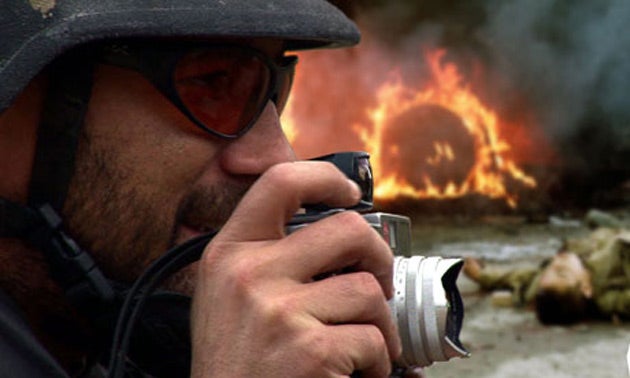Last Night's TV - Opera Italia, BBC4; Storyville: Killer Image – Shooting Robert King, BBC4
A well-conducted opening salvo

Nobody does traffic jams quite like the Italians. I spent most of last Friday morning trying to get to Ancona airport on the Adriatic coast in my little rented Fiat, a task rendered nigh on impossible by the passing cyclists contesting the Giro d'Italia, for whom most thoroughfares out of the city, notably the one to the airport, had been closed.
The Giro d'Italia is one of Italy's major sporting events, its passage through the streets of Ancona organised months in advance, so you'd think that only hapless foreign visitors would be thrown by the road closures. But no. They seemed to have taken every motorist in the city by surprise, and the result was a comedy Italian traffic jam; gridlock in all directions, with blaring horns, frantic gesticulating, exasperated Carabinieri, and every second car stuck halfway through a nine-point turn. So when Antonio Pappano observed in Opera Italia that all human life and emotion were on display, and that we could expect "love, betrayal, revenge, sorrow, passion, tragedy and comedy", he could easily have been talking about the Italian traffic jam. Instead, he was talking about something else his compatriots do better than anyone: opera.
Pappano, the music director of the Royal Opera House, was a hugely engaging presenter of last night's opening salvo of Opera Italia, a three-part series about, in his entirely unbiased view, "the most thrilling art form of all". If the programme had a flaw, I sensed that its makers could not quite decide whether they were evangelising, or preaching to the converted. Whether the converted enjoyed it, I cannot say. But from the point of view of one who scarcely knows his arias from his elbow, and assumed before the 1990 World Cup that "Nessun Dorma" was a brand of Japanese camper van, it worked triumphantly. I wouldn't go so far as to suggest that Pappano can expect me in the stalls at Covent Garden any time soon, but for the first time I could understand why opera casts such a spell over its devotees.
Moreover, Pappano explained its origins with pleasing clarity. I'd previously had no idea of the distinction between opera seria and opera buffa, the latter focusing on the comedy and sometimes tragedy of ordinary life, like Coronation Street set to music. Indeed, much of modern popular culture has antecedents in Italian opera, not least the superstar phenomenon; those 19th-century composers and singers were feted like movie and sports stars today. Giacomo Puccini was the Lionel Messi of his era.
Of course, celebrity in any age and all countries, but especially our own age and this country, is not always heaped upon those who deserve it most. At any rate, with the publication of every honours list comes a new set of medals and knighthoods for those already hugely well-remunerated and recognised for their talents. A sports star earning £5m a year can get an MBE for the endeavours of a few months, or weeks, or even hours, when the community workers in the same queue at the Palace have toiled for entire careers.
Within my own profession, there is a similar skewed system of reward and recognition. How many war photographers, for example, are household names? Fewer than you can count on the fingers of one hand, I'll wager. But now try frothy lifestyle columnists or even television critics, whose most perilous decision is whether or not to balance a mug of tea on the arm of the sofa (and believe me, I've come a cropper more than once).
Anyway, a terrific documentary in the Storyville strand, Killer Image – Shooting Robert King, went a small way to redressing the balance. King is from Memphis, so there won't ever be an MBE, but he has plenty of unfeted British counterparts, several of whom popped up in this film to marvel at his transformation from hopeless novice in Sarajevo in 1993, a man who got sacked by his agency for sending out-of-focus photographs, and worryingly was warned by one of those Brits that "I'm not sure you have the aura of luck that war photographers need", to the resourceful pro operating in Iraq and Afghanistan today, with covers of Time and Newsweek in his locker.
At first, I admit to wondering why I was devoting 80 minutes of my day to the travails of a dope-addled, slow-talking Tennessean, but gradually, forcefully, his story drew me in. Neatly, his entire life had followed the same pattern as his career, starting with his parents' low expectations and moving towards a poignant scene with his father, a retired music producer who'd been a heavy drinker and a rotten dad but was now full of inarticulate pride at his son's many accomplishments.
Those accomplishments have come at a human cost, however. King, whose syllables have speeded up as his dope intake has diminished, has lost count of the "nameless dead bodies" he has stepped over in the line of duty. He might no longer be "as much use as an ashtray on a motorcycle" in the memorable words of one British colleague, but his work doesn't seem to have brought him much emotional fulfilment. Happily, though, it has brought him a young son and a lovely Russian wife, even if she too wonders about his motivation for snapping through war zones. "How can you put your life in risk in order to show picture to someone who doesn't want to see it?" she asked, which was a fair question, but thank goodness he does.
Subscribe to Independent Premium to bookmark this article
Want to bookmark your favourite articles and stories to read or reference later? Start your Independent Premium subscription today.

Join our commenting forum
Join thought-provoking conversations, follow other Independent readers and see their replies